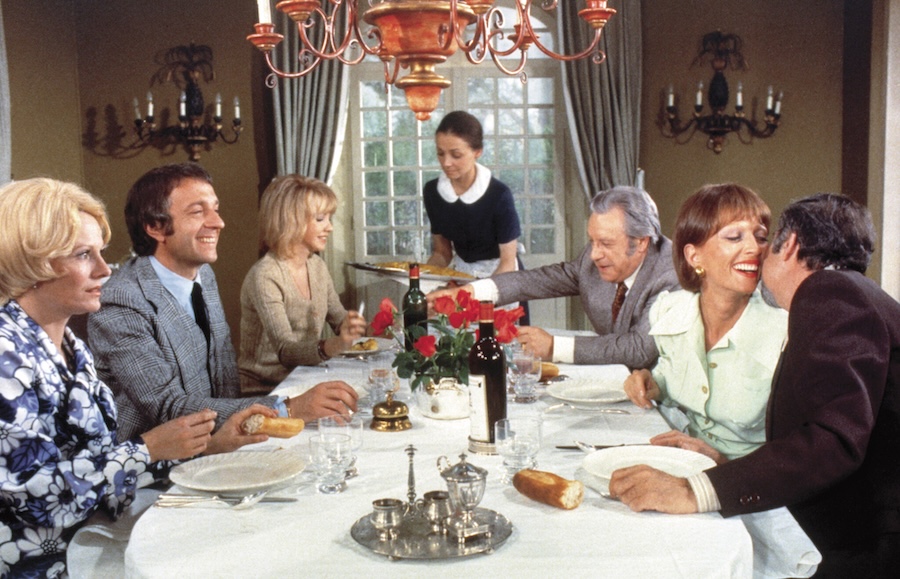

It was the same old story again. After making Tristana (1970), Luis Buñuel announced to the world that he was finished, as he had done after making Belle de Jour (1967). There would be no more films; he felt like he was repeating himself. Then he started talking to his frequent collaborator, Jean-Claude Carrière, and the subject of repetition came up. What if that could be the idea for a new movie? The final results became an Oscar winner, a film that is remembered as one of Buñuel’s best.
Forgetting about dinner
The idea for the film’s opening came from Buñuel’s producer Serge Silberman, who once told him that he had forgotten about a dinner and suddenly found himself with six hungry guests at his doorstep. In the film, the hosts are the Sénéchals (Jean-Pierre Cassel, Stéphane Audran) and the guests are the Thévenots (Paul Frankeur, Delphine Seyrig); Don Rafael Acosta (Fernando Rey), who’s the ambassador from a South American nation; and Florence (Bulle Ogier), Mrs. Thévenot’s sister. Since no dinner has been prepared, they all decide on a spontaneous visit to a local inn.
The restaurant is under new management, but the guests are shocked to learn that the former manager lies dead in a nearby room, where a vigil is held. They all leave in a hurry.
Dreams and police raids
That’s the first of many meals in this film that will be interrupted for various bizarre reasons. These elegant men and women, part of the bourgeoisie, will gather for drinks and a tasty supper, but something will always happen. Expect dreams, police raids and misunderstandings to create havoc. Fans of the director will feel right at home. Many in the cast are familiar, with an enjoyable part for Rey as the ambassador of a fictitious country who finds people’s perception of it offensive, but at the same time trades in cocaine and represents a regime that is targeted by a Maoist gerilla.
Buñuel once said that he thought all critics were wrong about this movie, but the thing is that not even the filmmaker gets to completely ”own” their work – it’s still open to interpretation, sometimes in ways that the director or writer might feel is ludicrous. A recurring theme in Buñuel’s films is the bourgeoisie and their lives. It’s easy to view the habits of the leading characters as silly, self-centered, greedy and mannered. Death constantly reminds them of real life, not least in dreams… but then again, there are dreams within dreams here, especially as we move into the latter half of the film.
The filmmakers keep our eyes glued to the screen, especially as we quickly realize that each sequence will end in surprising, surreal ways
The line between reality and fiction gets blurred. The filmmakers keep our eyes glued to the screen, especially as we quickly realize that each sequence will end in surprising, surreal ways. Everything is basically a joke; the whole setup is the opposite of what happens in the director’s The Exterminating Angel (1962) where the dinner guests have their lavish meal and find themselves unable to leave. Buñuel’s message is not to take things too seriously; after refusing to show up for the Academy Awards, he posed with the Oscar wearing a wig and outsized sunglasses, because why not.
This was Cassel’s first experience working with Buñuel and he found the lack of instructions frustrating. But he soon learned that what the director needed from him was not a deep interpretation of a character; he needed him to convey the titular discreet charm. There are some filmmakers where you just have to go with the flow and everything will be fine. This movie is authentically Buñuel, rich, funny and fascinating, but also perhaps more accessible than others.
The Discreet Charm of the Bourgeoisie 1972-France-Italy-Spain. 101 min. Color. Directed by Luis Buñuel. Screenplay: Luis Buñuel, Jean-Claude Carrière. Cast: Fernando Rey (Rafael Acosta), Paul Frankeur (François Thévenot), Delphine Seyrig (Simone Thévenot), Bulle Ogier, Stéphane Audran, Jean-Pierre Cassel, Michel Piccoli.
Trivia: Original title: Le charme discret de la bourgeoisie. Later turned into a musical, ”Here We Are”.
Oscar: Best Foreign Language Film. BAFTA: Best Actress (Audran), Original Screenplay.
Last word: “Actors are instruments to convey the director’s ideas – which is why I find all my roles difficult: I can’t betray the director. For Discreet Charm of the Bourgeoisie, however, I didn’t have all that much to do. Buñuel loved actors as human beings and treated them nicely, but was completely indifferent to them as actors – who played what, who I was… What mattered to him was that the film reflect the script, because he always wanted to be a writer. You had to render exactly what he wrote. You couldn’t make any departures.” (Ogier, Film Comment)
